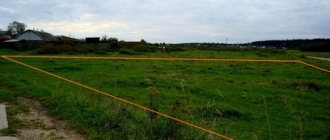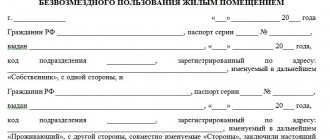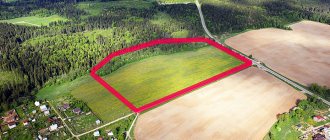Rights and obligations of the owner with the right of perpetual use
In accordance with article number 40 of the Land Code, the rights of the owner are as follows:
- The land user can use the territory for his own purposes: quarries, ponds, fresh groundwater.
- Build a house and other construction projects. But in accordance with the intended purpose, this rule should not be violated.
- If there is permission, he can carry out irrigation, drainage and other procedures.
- Build water bodies if this is not prohibited by the intended purpose of the land.
- Receive benefits from the sale of agricultural crops and products.
All this is permissible for sale on a land plot if it does not contradict the agreement. The right to permanent use of a plot of land is not a property right. Only the direct owner can legally dispose of this territory. Until recently, a land user (not the owner) could rent out land or transfer it for free, fixed-term use; now this is prohibited. This is evidenced by article number 270 of the Civil Code of the Russian Federation.
The right to permanent, unlimited use of a land plot
“What difference does it make what right I have to the land?” you ask.
“I use it, no one claims - that’s good,” add in the continuation.
Having repeatedly encountered similar questions and arguments, we decided to tell you about what the right of permanent (indefinite) use of a land plot is (we will simply call it below - PPZU), and why sometimes converting it into something else is not so simple. Introduction to the course: briefly about the main issues What problems can be encountered on the way to re-registering the PPZU
Introduction to the course: briefly about the basics
Without using intricate formulations from theory, let’s denote: if you have a PPZU, then you definitely have rights to a land plot, but you cannot perform all actions.
The limitation is that there is no power of disposal under the PPZU, which excludes the possibility of selling, leasing and other actions to dispose of the land (in fact, this is one of the reasons for re-registering the PPZU).
Let us note that at present, PPZU can be provided to a limited circle of entities, which does not include citizens and organizations that are not state and municipal institutions or state-owned enterprises.
Let us remind you that for legal entities there are special deadlines for re-registration: from PPZU to rent or from PPZU to ownership. Violation of such deadlines and registration procedures entails administrative liability.
The law does not provide for time limits for citizens.
It is also necessary to take into account the fact that not all objects can be re-registered as property.
Thus, rights to plots of land that are limited in circulation cannot be converted from PPZU into ownership. What problems can you encounter on the way to re-registering the PROM?
Process 1) development, the course of a certain phenomenon in the form of a sequential change of states in development; 2) the procedure for the proceedings of a judicial and administrative case, including the very case of re-registration of the PPZU, is not simple in any case, since it is necessary to find and collect all documents, interact with Rosreestr, etc.
And if accompanying obstacles arise along the way, then the very thought of re-registration becomes something scary. What might you encounter?
First. You have owned the land for a long time, you used it without problems, but you forgot to think about the documents, and they disappeared. Won't they reissue the PPZU now? Not at all. You will have to act through the court by filing an appropriate claim, but it is quite possible to achieve the desired result.
Second. It is not clear from the documents exactly what right is granted to the owner in relation to the land plot.
The Supreme Court of the Russian Federation has repeatedly considered cases in which lower courts denied heirs registration of land ownership due to the fact that from the documents presented:
- it is impossible to determine on what basis the testator used the land,
- the plot was not registered as ownership by the testator himself,
- land located on PPZU cannot be inherited.
The RF Supreme Court rightly recognized all three facts as unfounded, sending the cases for a new trial.
Therefore, if you, as an heir:
- there are no documents for the land,
- the plot is not registered as the property of the testator,
- it is not clear on what basis the plot was transferred to the testator,
These factors do not deprive you of the opportunity and right to register land rights.
Note that the above applies in the case of the initial provision of a plot before the Land Code of the Russian Federation was put into effect.
Third. State cadastral registration must be completed in accordance with current legislation, otherwise it will not be possible to register land ownership through the court. The Supreme Court of the Russian Federation speaks about this in its Ruling dated May 20, 2015 in case No. 304-ES14-7866, A45-1556/2014.
The situations presented above do not constitute an exhaustive list. The vast majority of controversial issues arise due to the lack of documents, an incomplete list of required documents, or insufficient information in such documents.
The land legislation of the Russian Federation is by no means easy to understand and analyze, and specific real-life cases are so individual that it is sometimes quite difficult to understand.
In order to avoid sleepless nights searching for information about what is needed and what is not, whether the registration of property rights was rightfully refused, and where to go now, contact specialists who will help find a way out of the situation and make sure that the land becomes Yours not only in fact, but also officially.
Legislative regulation
Within the framework of the Land Code of the Russian Federation, the right to use a land plot is terminated, and options for liability are spelled out if the conditions specified in the contract are violated. If we talk about the procedure for terminating this right, we should be guided by article number 53 of the Land Code of the Russian Federation. It spells out the entire process of relinquishing rights to a land plot on a voluntary basis.
It is necessary to consider Article No. 54 of the Land Code of the Russian Federation in the event that land is withdrawn from circulation from a specific person forcibly. When registering the right to permanent use of land, an agreement is drawn up, according to which the land will be exploited in the future. This document is similar to a lease agreement, but the amount of monthly payments is determined between the land user and the state.
Article number 29 of the Land Code of the Russian Federation acts as another regulator of the process of termination of rights. This entire process is also controlled at the local regional level.
In what form can termination of rights be implemented?
Guided by Article 45 of the Land Code of the Russian Federation, the right to permanent, unlimited use of a land plot can be terminated voluntarily or forcibly.
Voluntary
If you wish to renounce your rights to a plot, you must submit an application to the executive body. Termination of rights comes into force from the moment the termination of this right is formalized.
Forced
Forced renunciation of the right to permanent, unlimited use of a land plot is carried out only after the entry into force of a judicial act on the deprivation of lifelong (indefinite) use of a land plot.
NOTE! If you correct the violation that is causing the seizure, you can avoid litigation.
Procedure for termination of rights
If we are talking about voluntary refusal, you will initially need to apply to the local administration. This application must be submitted by both a legal entity and an ordinary citizen. It should display the reason for the refusal, your initials, cadastral data for the land, when the land was allocated and other information. In order to be accepted the first time, it is recommended that you first review a sample for drawing up such applications.
You must also have the following package of documents with you:
- documents confirming the identity of the citizen;
- if a legal entity is applying, provide an extract from the Unified State Register of Legal Entities;
- decree/decision of the municipality on the allocation of this land plot;
- boundary plan and other cadastral documents;
- a state certificate for the right to use a real estate object, or a certificate.
This issue should be resolved within one month. If the documents are not submitted within 3 days from the date of registration and acceptance of the application, consideration of the issue will be refused. The application will be sent back to the applicant for corrections. There may be typographical errors and other inconsistencies in the submitted documents.
Reasons
After accepting the application, the local executive body must prepare a project for terminating the right to use the land, coordinate and sign it with the authorized person who issued this plot.
The reason for termination of rights is stated directly by the applicant, and the powers of the local administration include consideration and decision-making. If the application was submitted by third parties (neighbors), they will not need to submit documents for this site. As mentioned earlier, a field commission will have to respond to the complaint. In the event of litigation, the land user must bring to court a number of arguments in his favor in order to preserve his rights.
If we talk about the forced alienation of a land plot from a land user, this procedure must take place in strict accordance with article No. 54-ZK RF, paragraph No. 2. Based on its content, it follows that if the land is in use by municipal/state/treasury institutions, it can be seized by authorized bodies without a court order. That is, this will happen if the condition of the earth deteriorates and other negative actions occur.
If the territory was provided for use by an individual, and the Unified State Register contains information about the provision of an allotment for perpetual use to this citizen, the seizure of the plot will occur on the basis of a court order. If a citizen's rights are violated, he can appeal the decision within 10 days from the date of its adoption.
If violations are detected at scientific institutions and specialized organizations that are part of the RAS, other methods will be applied to them. The decision to alienate a land plot is made at the federal level. The analysis of all presented evidence regarding the identified violation is taken into account.
STEP-BY-STEP INSTRUCTION
Each of the above paths has its own algorithm of actions for the decision to deprive the owner of the rights to the site to come into force. The decision will be legally effective only after complete and official registration of the abandonment of the site or its seizure.
How to terminate the right of permanent use without court (voluntary)
Voluntary refusal has the simplest algorithm of actions, consisting of only four points:
- submitting an application to the Committee;
- provision of a package of documents;
- waiting for a decision;
- receiving a copy.
More details in order. The first point includes drawing up an application for voluntary renunciation of possession of previously acquired territory and submitting it to the executive authorities. The second point includes the provision of a package of documents consisting of:
- original certificate of land acquisition and ownership;
- owner's certificate;
- registration of a legal entity;
- cadastral passport.
The wait specified in the third paragraph, according to current legislation, lasts up to 30 calendar days from the moment the application is accepted for consideration. 33 calendar days after this event, you must obtain a copy of the decision from the court.
How to use a land plot through court (forcibly)
In the case of forced cancellation of lifelong ownership rights, there are two algorithms for the development of events. The first consists of three points:
- receiving a warning due to misuse;
- correction of violations;
- payment of the penalty.
According to current legislation, a warning must consist of:
- list of violated duties;
- the period provided for elimination;
- clarification of the consequences if the violation is not corrected;
- rights if it comes to court intervention.
The law on penalties was last edited at the initiative of the president in March 2015. Chapter 46 of the Federal Law on administrative violations includes unauthorized appropriation of a site, which is also punishable by penalties, as well as misuse of acquired territories. The amount of the fine is calculated from the cadastral value of the territory and is:
- for individuals – from 0.3% to 1.5%;
- for legal entities – from 1.5% to 10%.
If the warning is ignored, the algorithm for the development of events is as follows:
- initiation of a case;
- consideration;
- decision-making;
- sending documents to organizations specializing in real estate registration within 10 days;
- payment of a fine in accordance with Chapter 46 of the Federal Law.
However, every citizen has the right to appeal the verdict.
Waiver of the right of permanent unlimited use - what is it and how to refuse
Waiver of the right to lifelong use is the official execution of documents depriving the right to use the territory according to the purpose specified during acquisition and use at one’s own decision.
This is resorted to when there is no need for the site. For refusal, a package of documents is delivered to the relevant authorities. The waiting period for a decision is 30 calendar days.
Rights and opportunities after trial: consequences
Articles 60 and 61 of the Land Code indicate that even after a verdict is passed, the owner has the right to appeal on two grounds:
- the court's decision;
- payment of the penalty.
Every citizen has the right to refute the court decision and take back his rights, but he will have to correct all violations and pay a fine. And the time to file an appeal is 10 days.
Payment of a fine can also be refuted if, in fact, there was no violation.
Termination of rights due to death
Persons who do not have the status of owner can only have real rights. Article number 268 of the Civil Code of the Russian Federation states on what exact grounds it will be possible to obtain the right to indefinite use of a land plot.
Relatives, in connection with the death of the testator, legally receive rights to all existing buildings on this land. But there are also exceptions to these rules. They are as follows:
- Heirs can complete the registration of ownership of the plot if this procedure was started by the testator, but was not completed due to his death.
- Heirs can claim property that is registered in their own ownership. The plot must be privatized or registered in some other way so that the heirs do not have any problems in the future.
Citizens who received the privilege to use the site for free before 2001 do not have to worry about their rights. But you can lose them if you violate the regulations for use. Individuals need to go through the privatization procedure and register land ownership. To do this, they need to find out from the notary’s office where to go to complete all these documents. This will give more advantages when using the territory than with free perpetual use. You can register a plot of land as your own only by a court decision.
Consequences of termination of the right to permanent use of land
In case of unauthorized renunciation of the territory, the citizen deprives himself of the right to continue to exploit the allotment. Along with it, the obligations to maintain the allotment in proper condition also cease. Namely: timely payment of taxes and payments for utilities, implementation of procedures to improve the fertile qualities of the site. If all this is done in a timely manner, then there is no question of encumbrance, since everything is in order with the land and the documents.
If the land is forcibly taken, the citizen completely loses all rights. He will not be able to build on this land, continue to exploit the site for profit, or perform other manipulations. As for the obligations directly, he will have to bring the allotment into proper condition. He carries out all these procedures at his own expense. In case of non-compliance, he will face additional costs in the form of penalties.
You can restore your rights at any time. To do this, you will need to go to court along with an application. If he can challenge the decision by presenting the results of the examination, certificates and extracts, he will be able to restore his rights and continue to exploit the land plot.
Making entries upon termination of a perpetual right
If the right to permanent use of the site is terminated, the state institution does not have the right to take the site into account in budget accounting 0.103.11.000. Budget accounting must indicate all plots retired from circulation, including those withdrawn from use by citizens. The basis for registering land is a certificate confirming the right to use the land.
Accounting entries for the plot until the registration of the right of perpetual use are carried out on off-balance sheet account 01. After an extract from the unified real estate cadastre is received, the plot is accepted in debit account 0.103.11.330. Autonomous and budgetary institutions must adjust their settlements with the founder for the cost of the land plot accepted for registration. All postings are made to account 4.210.06.000.










